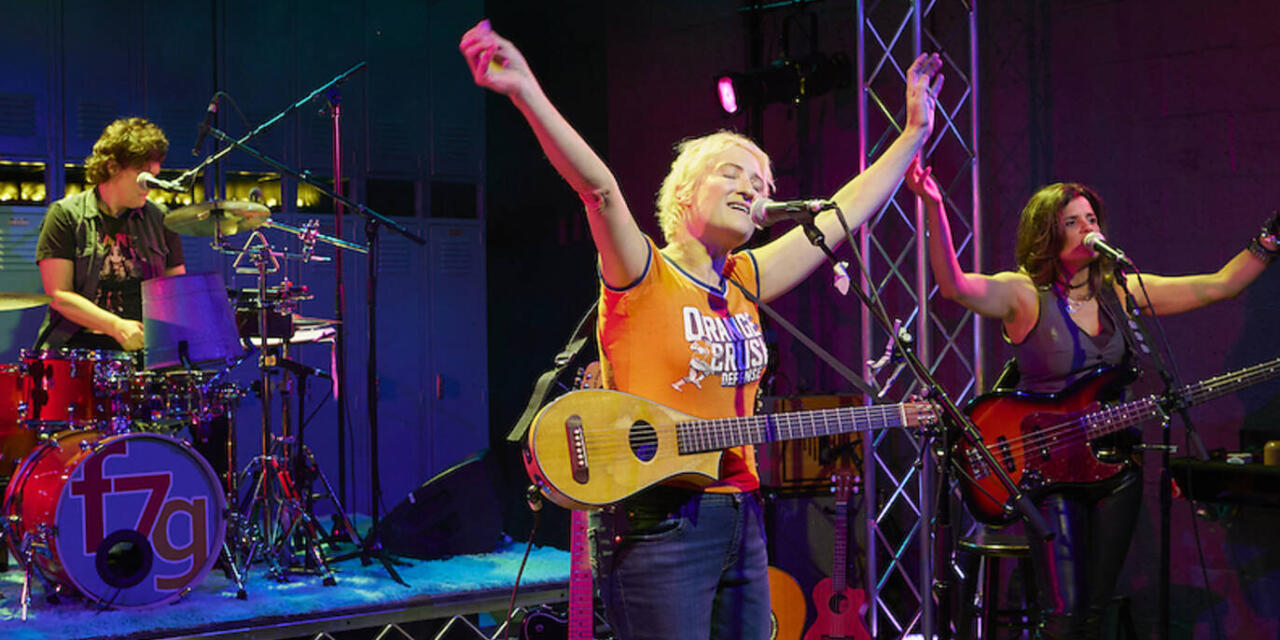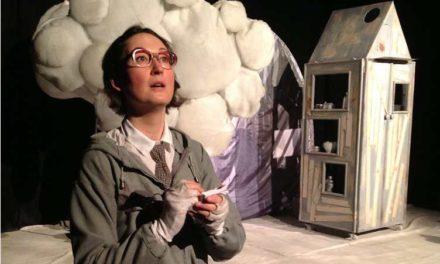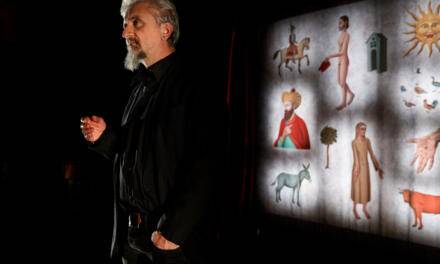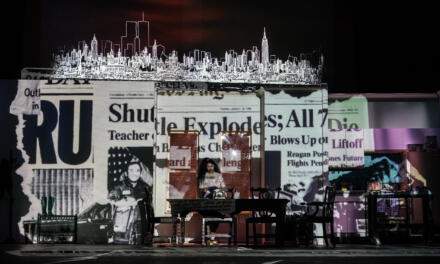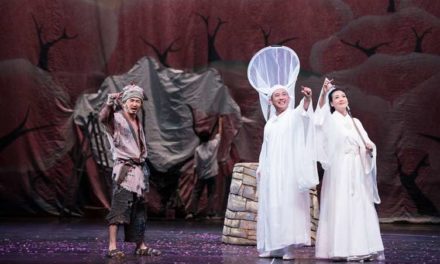F*ck7thGrade is messy, it’s awkward, it’s unrelentingly earnest, and it’s utterly delightful. Singer-songwriter Jill Sobule’s queer coming-of-age concert musical didn’t win me over right away, but once I settled into the groove of her idiosyncratic, wide-eyed storytelling, I was certain I’d become a forever fan not only of her music, but of Sobule herself.
As the title suggests the show, directed by Lisa Peterson, begins with the middle school years and the suggestion that they are a generally rough time for most. Or, as Sobule puts it, “Did any of you feel awesome when you were thirteen? Raise your hand if you wanted to die.” She speaks directly to the audience and without irony assures us that she had it worse than we did, but what makes the show so heartbreaking and charming is that of course Sobule’s woes are the same sorts of passing, yet consuming crises many in the audience likely experienced. She feels weird, her friends don’t want to hang out with her anymore, and she doesn’t have the language to understand her own desires. The stories are full of juicy specifics (a family trip to “Beaver’s Ranch”, the birthday gift of a “Raleigh Blue Chopper” bike) and colorful descriptions (a girl who was like “an incredible combination of Marcia Brady and a meth-smoking biker chick”) but her particulars only magnify the universals.
Though it feels conversational, the show has a smartly curated book by Liza Birkenmeier that makes better use of the theatrical context (as opposed to it being simply a concert) as the night goes on. Sobule’s bandmates, once merely imaginary now manifested onstage in the remarkably talented and fun-to-watch forms of Kristen Ellis-Henderson on drums, Nini Camps on bass, and Julie Wolf (also the musical director) on keyboards, step in to play various antagonists, lovers, and allies. Often they gather props and costumes (David F. Zambrana) to situate us in time from the wall of lockers that serve as the centerpiece of Rachel Hauck’s beautiful, imposing, but still fittingly punk-rock set.
Sobule’s delectable folk-rock catalog is mined throughout, but when it is time in the chronology to play her seminal song “I Kissed a Girl”, one of the pair that made her, in her words, a “two-hit wonder”, she reveals that she felt she lost control of the number when due to external pressure she failed to publicly claim it (and herself) as out and proud gay. The pain she feels about the disconnect between her ambitions, her sense of self, and how she is perceived bring back all those nasty middle school insecurities in one of the most vulnerable sections of the show.
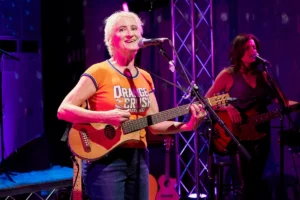
Jill Sobule and Nini Camps in “F*ck7thGrade”. Photo by Eric McNatt
The exploration of this time in her career also made me think about how conversations around identity, marketing, and the relationship of performers to the public have changed in the current age of celebrity, parasocial relationships, and social media. Stars like Taylor Swift and Harry Styles have never publicly claimed any sexuality label yet are held by some as queer icons and accused by others of queer baiting (profiting off of queer identity without committing to it). Meanwhile, other celebrities like Rebel Wilson and Kit Connor have been publicly outed or pressured to come out on timelines other than their own. At the same time celebrities who do openly identify as queer often do not receive as much media attention (especially if they are queer people of color). Sobule doesn’t take on this larger context, but it is interesting to see for her how the compromises and perceptions on the public level affected her private world. It left me with many questions. What (if anything) do queer artists owe their fans? What do they owe themselves? Where is there room for fluidity, exploration, and grace?
As for Sobule, when she does eventually play her once-loathed song, it’s a triumphant, cathartic reclamation. Within the world of the show the performance is for a small audience and it’s not the song’s far-reaching success, or even its revolutionary implications, that make it so impactful, but rather how it leads to interpersonal connection and joy. This scene also led to perhaps one of my all-time favorite lines I’ve ever heard in a show: “Look! The barista has a glockenspiel!” The moment is perfectly silly and epitomizes the warm, sometimes campy humor of the piece.
Sure the piece could use some tightening up. Sometimes the material is repetitive from scene to song, and there are about three moments where it feels like the show should end (I was thrilled each time when it didn’t but nonetheless), and for a show titled F*ck7thGrade, it moves on pretty quickly to the college years. But the sort of “let’s put on a show!” spirit and mess is part of the heart that makes it all feel so special.
We are all (at least most of us) somewhat traumatized, but altogether shaped by our middle school years. This is expressed in an especially touching moment toward the end of the show where each band member speaks about their own beautifully mundane, embarrassing, world-altering seventh-grade selves. Sobule had it worse than everyone else in seventh grade because being completely, singularly miserable is just what seventh grade feels like. But having made it through, F*ck7thGrade is a wonderful place to come together to laugh about and heal from the not-so-good old days. Sobule is a hero of the oddballs, a true “Underdog Victorious” (as one of her songs might put it) and it’s a gift to watch her at The Wild Project for this victory lap.
This post was written by the author in their personal capacity.The opinions expressed in this article are the author’s own and do not reflect the view of The Theatre Times, their staff or collaborators.
This post was written by Morgan Skolnik.
The views expressed here belong to the author and do not necessarily reflect our views and opinions.

